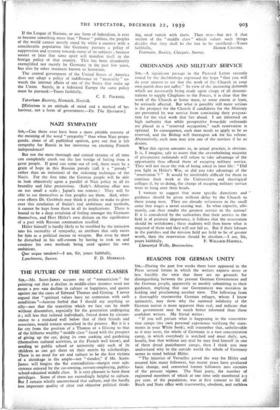THE FUTURE OF THE MIDDLE CLASSES
Sta,—Mr. Scott-James accuses me of " romanticism " for pointing out that a decline in middle-class incomes need not mean a pro rata decline in culture or happiness, and quotes against me the cases of Edward Thomas and Gissing. I never argued that " spiritual values have no connexion with cash conditions "—heaven forbid that I should say anything so silly—nor that the transition which we face can be made without discomfort, especially for the generation undergoing it ; still less that isolated individuals, forced down by circum- stance to a standard well below that of their friends and associates, would remain unscathed in the process. But it is a far cry from the position of a Thomas or a Gissing to that of the hitherto wealthy " middle class " faced with the prospect of giving up the car, doing its own cooking and gardening (themselves cultural activities, as the French well know), and sending to public school or university only such of its children as can get there on their merits by scholarships. There is no need for art and culture to be the first victims of a shrinkage in the ample—not " slender," if Mr. Scott- James will forgive the flat contradiction—margin over sub- sistence enjoyed by the car-owning, servant-employing, public- school-educated middle class. It is very pleasant to have these privileges. Some of them are exceedingly helpful to culture. But I remain wholly unconvinced that culture, and the hardly less important quality of clear and objective political think-
ing, need vanish with them. They may—but not if that section of the " middle class " which values such things decides that they shall be the last to be sacrificed.—Yours faithfully, HONOR CROOME. Pearmain, Ruxley, Claygate, Surrey.




































 Previous page
Previous page